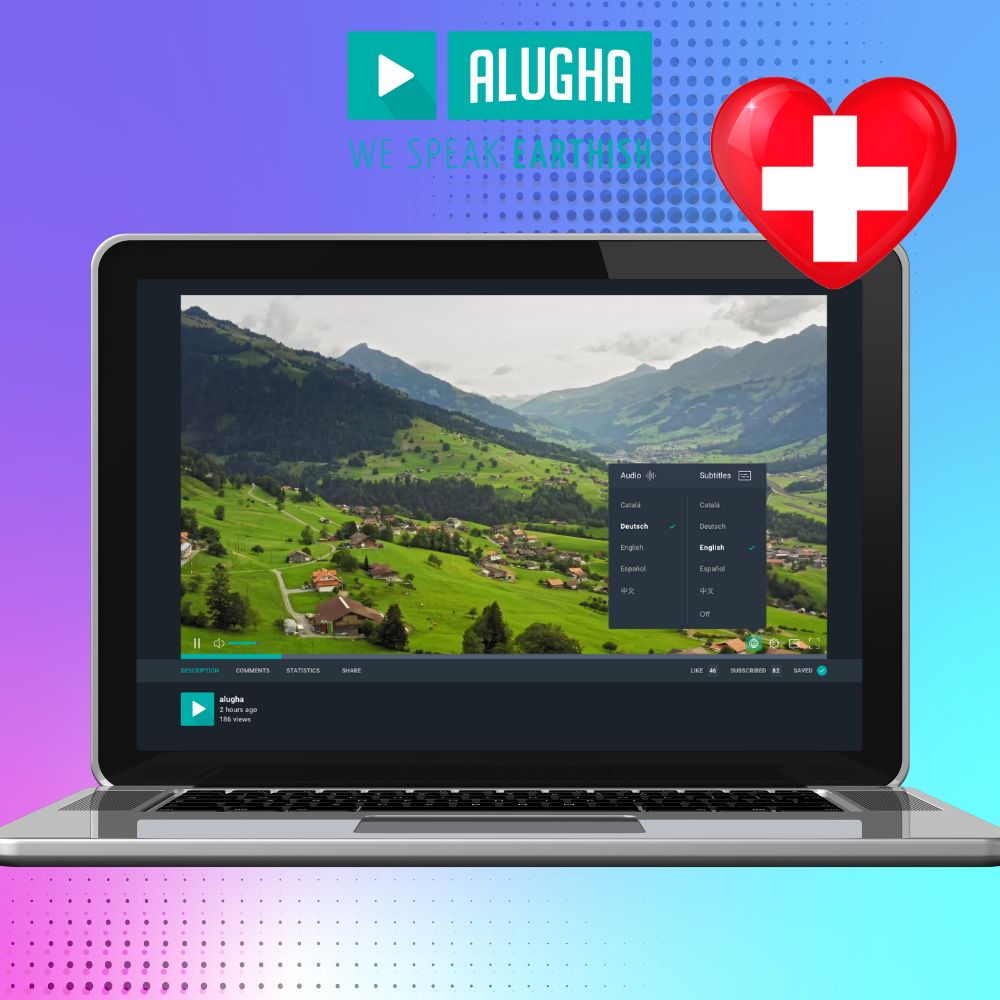alugha goes podcasts
Thanks to alugha, it is now possible to listen to podcasts, to enregister them as well as to trancribe and to multilingualise them
For the Swiss National Day, we travel through the languages of this country.

Read this article in: Deutsch, English, Français
Estimated reading time:2minutesSwitzerland is considered a very beautiful country with many lakes, mountains and cities. This idyll is also home to several languages. No less than four languages are official languages that coexist, i.e. there are four linguistic regions in each of which one language is dominant: German, French, Italian and Rhaeto-Romance.
German-speaking Switzerland is the largest language area. About 60% of the Swiss speak German as their first language. For the most part, however, it is Swiss German and not Standard German that children are born with. However, it is not a uniform dialect, but a variety of Alemannic dialects, which are, however, all mutually understood. There is also Swiss Standard German, which is used in written and official oral communication. This Swiss Standard German differs from Federal German in many places. Examples of Helvetisms are the missing "ß" or a different vocabulary such as "decision" instead of the Federal German "Entscheidung". Swiss Standard German grammar also appears different from that of Federal German.
Furthermore, linguists assume that two mental language systems are represented, one for Standard German and one for Swiss German.
The French-speaking area in Switzerland, Romandie, is growing. Each region in French-speaking Switzerland has its own linguistic idiosyncrasies and accents, but Swiss French differs little from standard French, except for Germanisms and archaisms.
Another language in Switzerland is Italian. It is spoken in the canton of Ticino and in a small part of the canton of Graubünden. In this case, too, the Swiss variety of Italian has some peculiarities that have come about through language contact with German and French.
This is a large number of Rhaeto-Romance varieties, some of which are very different from each other. This language has only a small number of speakers.
Generally in Switzerland is that at least one other official language should be learned and promoted.
Numerous other languages have come to Switzerland through immigration. In percentage terms, there are more non-national language-speakers than Italian and Rhaeto-Romance languages altogether. English and Portuguese in particular are gaining in importance, as are Russian, Serbian and Croatian.
Finally, two autochthonous minorities should be mentioned: Yiddish and Yenish. However, these are also receiving less attention in terms of language policy, especially since there are also (Jewish) associations that oppose measures to promote Yiddish.
However, the various sign languages of the country are important and should not be ignored.
The alugha team wishes all Swiss a happy National Day!
#alugha
#wespeakearthish
#multilingual
Sources:
https://de.wikipedia.org/wiki/R%C3%A4toromanische_Sprachen (01.08.2022, 09:34)
https://de.wikipedia.org/wiki/Schweizer_Franz%C3%B6sisch (01.08.2022, 09:35)
https://de.wikipedia.org/wiki/Schweizer_Hochdeutsch (01.08.2022, 09:35)
https://de.wikipedia.org/wiki/Schweizer_Italienisch (01.08.2022, 09:34)
https://de.wikipedia.org/wiki/Sprachen_in_der_Schweiz (01.08.22, 09:37)
https://www.eda.admin.ch/aboutswitzerland/de/home/gesellschaft/sprachen/die-sprachen---fakten-und-zahlen.html (01.08.2022, 09:38)
https://www.eda.admin.ch/aboutswitzerland/de/home/gesellschaft/sprachen/mehrsprachigkeit.html (01.08.2022, 09:40)
https://www.eda.admin.ch/aboutswitzerland/de/home/gesellschaft/sprachen/sprachen-und-dialekte.html (01.08.2022, 09:39)
https://www.zora.uzh.ch/id/eprint/172228/1/Ruoss_2019_Schweizerdeutsch%20und%20Sprachbewusstsein.pdf (01.08.2022, 09:52)
| Code | Name | Views | Percentage |
|---|---|---|---|
| eng | English | 47 | 55.29% |
| deu | Deutsch | 31 | 36.47% |
| fra | Français | 7 | 8.24% |
| Total | 85 | 100% | |
Thanks to alugha, it is now possible to listen to podcasts, to enregister them as well as to trancribe and to multilingualise them
Podcasts enjoy great popularity. However, you still don't find transcripts for them that often. But why do you actually need a podcast transcript? And how do I create one?
The year 2023 has started and the alugha team wishes you a happy, healthy and successful new year. We also have a tip for you: start your year multilingually!